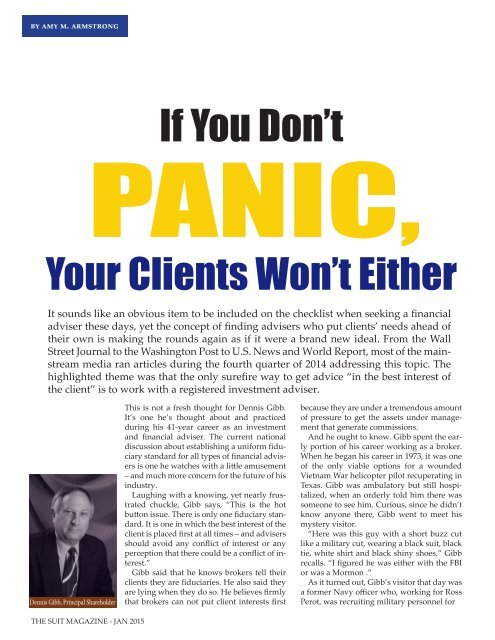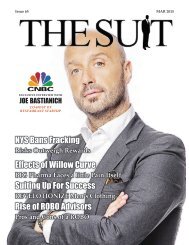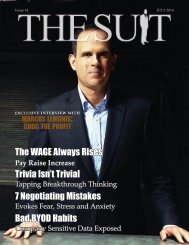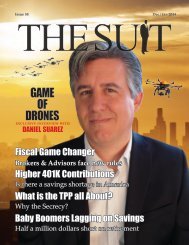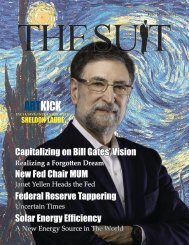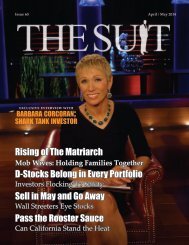Kayla Tausche CNBC
The arrival of January seems to bring out the list-making in the media. There are reviews of the previous year and predictions for the one we are now in. Publications commonly create a list of Top 40 Business People that are under the age of 40 as top entrepreneur’s to watch for the upcoming year. It used to be that 40 was the target for career establishment. Not anymore. In today’s aggressive market place, a long track record of success prior to age 30 is not uncommon. Credit technology is the empowerment of the Millennials. The reality is that the age bracket in which 30 is considered old, don’t just have extensive resumes – they have already formed in irreversible impact. That’s why The Suit Magazine opted to highlight six of these movers and shakers in our first edition for 2015. As expected, our list contains success stories from social media. There is no denying the changes and questions the emergence of social media brings to our world. Yet, our list goes further.
The arrival of January seems to bring out the list-making in the media. There are reviews of the previous year and predictions for the one we are now in. Publications commonly create a list of Top 40 Business People that are under the age of 40 as top entrepreneur’s to watch for the upcoming year. It used to be that 40 was the target for career establishment. Not anymore. In today’s aggressive market place, a long track record of success prior to age 30 is not uncommon. Credit technology is the empowerment of the Millennials. The reality is that the age bracket in which 30 is considered old, don’t just have extensive resumes – they have already formed in irreversible impact. That’s why The Suit Magazine opted to highlight six of these movers and shakers in our first edition for 2015. As expected, our list contains success stories from social media. There is no denying the changes and questions the emergence of social media brings to our world. Yet, our list goes further.
Create successful ePaper yourself
Turn your PDF publications into a flip-book with our unique Google optimized e-Paper software.
y amy m. armstrong<br />
If You Don’t<br />
PANIC,<br />
Your Clients Won’t Either<br />
It sounds like an obvious item to be included on the checklist when seeking a financial<br />
adviser these days, yet the concept of finding advisers who put clients’ needs ahead of<br />
their own is making the rounds again as if it were a brand new ideal. From the Wall<br />
Street Journal to the Washington Post to U.S. News and World Report, most of the mainstream<br />
media ran articles during the fourth quarter of 2014 addressing this topic. The<br />
highlighted theme was that the only surefire way to get advice “in the best interest of<br />
the client” is to work with a registered investment adviser.<br />
Dennis Gibb, Principal Shareholder<br />
This is not a fresh thought for Dennis Gibb.<br />
It’s one he’s thought about and practiced<br />
during his 41-year career as an investment<br />
and financial adviser. The current national<br />
discussion about establishing a uniform fiduciary<br />
standard for all types of financial advisers<br />
is one he watches with a little amusement<br />
– and much more concern for the future of his<br />
industry.<br />
Laughing with a knowing, yet nearly frustrated<br />
chuckle, Gibb says, “This is the hot<br />
button issue. There is only one fiduciary standard.<br />
It is one in which the best interest of the<br />
client is placed first at all times – and advisers<br />
should avoid any conflict of interest or any<br />
perception that there could be a conflict of interest.”<br />
Gibb said that he knows brokers tell their<br />
clients they are fiduciaries. He also said they<br />
are lying when they do so. He believes firmly<br />
that brokers can not put client interests first<br />
because they are under a tremendous amount<br />
of pressure to get the assets under management<br />
that generate commissions.<br />
And he ought to know. Gibb spent the early<br />
portion of his career working as a broker.<br />
When he began his career in 1973, it was one<br />
of the only viable options for a wounded<br />
Vietnam War helicopter pilot recuperating in<br />
Texas. Gibb was ambulatory but still hospitalized,<br />
when an orderly told him there was<br />
someone to see him. Curious, since he didn’t<br />
know anyone there, Gibb went to meet his<br />
mystery visitor.<br />
“Here was this guy with a short buzz cut<br />
like a military cut, wearing a black suit, black<br />
tie, white shirt and black shiny shoes,” Gibb<br />
recalls. “I figured he was either with the FBI<br />
or was a Mormon .”<br />
As it turned out, Gibb’s visitor that day was<br />
a former Navy officer who, working for Ross<br />
Perot, was recruiting military personnel for<br />
THE SUIT MAGAZINE - JAN 2015


